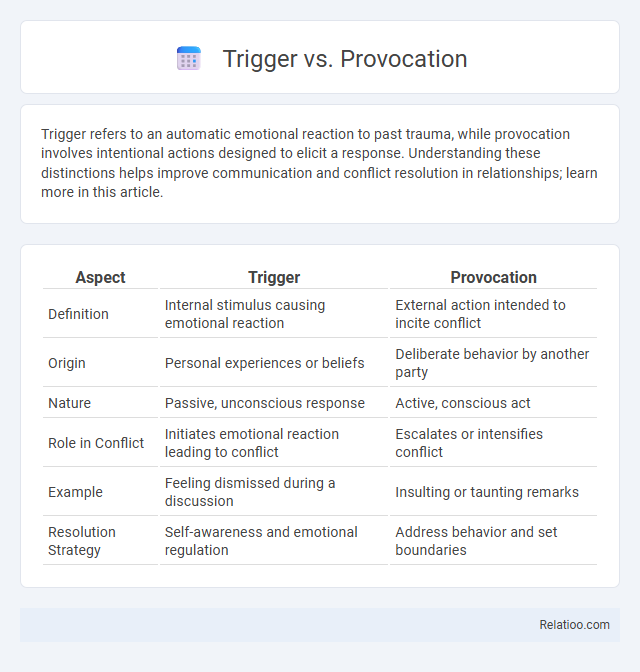Trigger refers to an automatic emotional reaction to past trauma, while provocation involves intentional actions designed to elicit a response. Understanding these distinctions helps improve communication and conflict resolution in relationships; learn more in this article.
Table of Comparison
| Aspect | Trigger | Provocation |
|---|---|---|
| Definition | Internal stimulus causing emotional reaction | External action intended to incite conflict |
| Origin | Personal experiences or beliefs | Deliberate behavior by another party |
| Nature | Passive, unconscious response | Active, conscious act |
| Role in Conflict | Initiates emotional reaction leading to conflict | Escalates or intensifies conflict |
| Example | Feeling dismissed during a discussion | Insulting or taunting remarks |
| Resolution Strategy | Self-awareness and emotional regulation | Address behavior and set boundaries |
Understanding the Concepts: Trigger vs Provocation
Understanding the concepts of trigger and provocation involves recognizing that a trigger is an involuntary emotional or psychological reaction to a specific stimulus often linked to past trauma, while provocation is a deliberate action intended to elicit a response or anger from someone. Your emotional triggers are deeply personal and can cause distress without any intentional cause, whereas provocations are purposeful behaviors or remarks designed to provoke. Differentiating between these concepts helps in managing your reactions and responding more effectively in challenging situations.
Defining Triggers in Emotional Responses
Triggers are external stimuli or events that evoke intense emotional reactions by reminding individuals of past traumatic experiences. Provocations refer to deliberate actions or remarks intended to elicit a specific emotional or behavioral response, often anger or frustration. Understanding triggers involves recognizing subconscious connections between present cues and prior emotional pain, distinguishing them from provocations that are consciously crafted to provoke.
What Constitutes a Provocation?
A provocation constitutes any action or statement intentionally designed to elicit a strong emotional response, often anger or irritation, in a specific individual or group. Unlike general triggers, which may cause reactions based on personal sensitivities or past trauma, provocations are deliberate acts aimed at provoking conflict or agitation. Understanding the nature of a provocation helps you assess situations objectively and respond with measured composure.
Psychological Impact: Trigger vs Provocation
Triggers are intense stimuli that evoke strong emotional or psychological responses, often linked to past trauma or anxiety disorders, significantly affecting your mental state. Provocations, while potentially irritating or stressful, usually aim to elicit a reaction but lack the deep emotional resonance and trauma connection that triggers possess. Understanding the nuanced psychological impact of triggers versus provocations helps in managing emotional responses and maintaining mental well-being.
Key Differences Between Trigger and Provocation
Trigger refers to an internal or external stimulus that elicits an automatic emotional or psychological response, often linked to past trauma or conditioning. Provocation involves a deliberate action or statement designed to elicit a specific reaction, often anger or annoyance, from another person. Understanding the key differences between trigger and provocation can help you manage emotional responses and interpersonal conflicts more effectively.
Real-Life Examples: Triggers and Provocations
Triggers refer to stimuli that evoke automatic emotional or psychological reactions, such as a war veteran experiencing PTSD flashbacks upon hearing fireworks. Provocations involve deliberate actions intended to elicit a response, like a coworker purposely making sarcastic comments to irritate a colleague. In real life, recognizing triggers, such as loud noises or specific smells, and distinguishing them from provocations helps individuals manage their emotional reactions and maintain healthier interactions.
Cultural Perspectives on Triggers and Provocations
Cultural perspectives on triggers and provocations vary significantly, as triggers often relate to deeply personal or collective trauma unique to a community's history, such as war, colonization, or systemic injustice. Provocations tend to be culturally contextual actions or statements designed to incite anger or confrontation, with meanings shaped by social norms and values within specific societies. Understanding these distinctions requires awareness of cultural sensitivity and the socio-historical background influencing emotional responses and conflict dynamics.
Managing Emotional Reactions to Triggers and Provocations
Managing emotional reactions to triggers involves recognizing internal cues that elicit intense feelings, while provocation refers to external actions designed to provoke specific responses. Effective strategies include grounding techniques to reduce impulsivity caused by triggers and assertive communication to address provocations without escalating conflict. Differentiating between triggers and provocations enables tailored emotional regulation approaches, promoting resilience and improved interpersonal interactions.
Misconceptions and Myths: Trigger vs Provocation
Trigger and provocation are often confused, but triggers typically refer to stimuli that cause involuntary emotional or psychological reactions, especially in trauma-related contexts. Misconceptions arise when provocation, which involves deliberate actions intended to elicit a response, is mistaken for a trigger, leading to misunderstandings about intent and impact. Clarifying these distinctions is essential for effective communication and trauma-informed care.
Building Emotional Resilience to Triggers and Provocations
Triggers are specific stimuli causing emotional reactions based on past experiences, while provocations are intentional actions designed to elicit strong responses; understanding these distinctions is crucial for building emotional resilience. Techniques like mindfulness, cognitive reframing, and stress inoculation training enhance emotional regulation, enabling individuals to manage reactions to triggers and provocations effectively. Strengthening emotional resilience reduces vulnerability to negative impulses, promoting mental well-being and adaptive coping strategies in challenging interpersonal scenarios.

Infographic: Trigger vs Provocation
 relatioo.com
relatioo.com